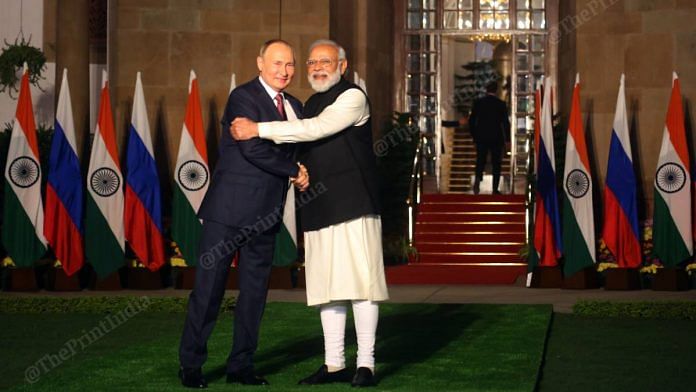New Delhi: Old friends India and Russia broke new ground in their relationship as they held their first 2+2 dialogue and President Vladimir Putin also came calling for a five-hour visit — only his second trip abroad since the pandemic gripped the world — for a summit meeting with Prime Minister Narendra Modi.
The optics were significant, especially in the light of the strong bond New Delhi has forged with Washington in recent years.
India and Russia signed 28 agreements Monday. India underlined its goal of becoming Russia’s defence development and production partner from just a buyer, and even raised Chinese aggression in Ladakh, telling Moscow that “India seeks partners who are sensitive and responsive to its expectations and requirements”.
Referring to the Russian President as a “friend”, PM Modi said “our meeting today will strengthen our Special and Privileged Strategic Partnership. The initiatives that we take today will further increase the scope of our cooperation to new areas”.
According to Foreign Secretary Harsh Vardhan Shringla, the biggest takeaways from the annual summit and the inaugural 2+2 ministerial talks were the signing of 10-year military-technical partnerships, as well as the plan to jointly produce the AK-203 assault rifles under the ‘Make in India’ initiative.
Also read: From buyer of military goods, India wants to become Russia’s ‘development & production’ partner
Military cooperation, R&D
The joint statement issued after the meeting said military and military-technical cooperation has traditionally been the pillar of the “Special and Privileged Strategic Partnership between India and Russia”.
“Responding to India’s quest for self-sufficiency, the partnership is reorienting to joint research and development, co-development and joint production of advanced defence technology and systems,” the statement read.
In a 2+2 meeting earlier in the day, Defence Minister Rajnath Singh and External Affairs Minister S. Jaishankar held talks with their Russian counterparts, Sergey Shoygu and Sergey Lavrov.
During both the summit and the 2+2 talks, India and Russia discussed each other’s national security concerns, ranging from the Indo-Pacific to China to Ukraine.
Shringla also said the supply of S-400 air defence missile systems had begun this month and “will continue to happen”, adding that India follows an “independent foreign policy” — hinting at the US’ Countering America’s Adversaries Through Sanctions Act (CAATSA) — although he said the issue didn’t come up during the talks.
However, the much-touted Reciprocal Exchange of Logistics (RELOS) agreement was not signed. According to Shringla, some issues still need to be discussed.
The joint statement said Modi and Putin agreed that for peace, stability and mutual economic development, there is a need for the two countries to work closely together in the advanced and emerging fields of defence technology, and for their armed forces to work together in niche domains of military capabilities.
Security dialogue, Afghanistan, infrastructure
On the security dialogue between the countries, the joint statement said: “The leaders reiterated the importance of the security dialogue at the level of NSA and NSCS on bilateral and regional issues, and welcomed regular interactions between them. This has served to enhance strategic understanding and coordination between the two countries.”
On the situation in Afghanistan, both sides discussed the mechanism to send and distribute humanitarian aid and assistance, but there was no discussion on legitimising the Taliban regime there.
“The leaders emphasised that Afghanistan’s territory should not be used for sheltering, training, planning or financing any terrorist groups including ISIS, Al Qaeda, LeT etc. They reaffirmed their firm commitment to combat terrorism in all its forms and manifestations, including its financing, the dismantling of terrorist infrastructure and countering radicalisation, to ensure that Afghanistan would never become a safe haven for global terrorism,” the statement read.
It added that the two sides had reiterated their joint efforts under the Roadmap for Cooperation in Hydrocarbons for 2019-24 to further deepen bilateral cooperation in the energy sector.
India and Russia also vowed to enhance transport and connectivity while taking two-way trade to $30 billion by 2025.
(Edited by Rohan Manoj)
Also read: China, US tussle over Joe Biden’s democracy summit



